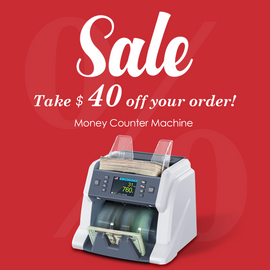When you need to count coins, you may not question the reliability of the machines that do it for you. But how accurate is coin counting equipment? It's important to know whether or not you can trust the equipment you're using, especially when it comes to money.
In this blog post, we will explore the accuracy of coin-counting machines and what factors can affect it. Read on to learn more.
How Do Coin Counters Work?
Coin counters use sensors to identify the types of coin and count each type as it is faded into the machine. The sensors can distinguish coin types by size, weight, and metal composition.
The information collected by the sensors is then used to calculate the total value of the coins counted.
Can I Count On Coin Counting Equipment?
Coin-counting machines are typically very accurate, with most models able to count coins with a high degree of accuracy. However, a few factors can impact the accuracy of coin counters.
One factor is the condition of the coins being counted. The machine can sometimes misidentify coins that are damaged or dirty, which can lead to an inaccurate count.
Another factor impacting accuracy is how the coins are fed into the machine. If coins are consistently fed into the machine, it can prevent them from being counted inaccurately.
How Accurate Are Coin Counters?
There is no simple answer to the question of how accurate coin counters are. The accuracy of a coin counter depends on many factors; the quality of the machine, the type of coins being counted, and the operator's skills and experience.
That said, most coin counters are generally entirely accurate, with some models boasting accuracy rates of up to 99.9%. However, it's always best to double-check your count before withdrawing any money from a coin-counting machine to be sure.
How To Increase The Accuracy Of Coin-Counting Equipment?
A few things can be done to help ensure more accurate coin counting from machines.
First, ensure that the coins are correctly sorted before being fed into the machine. It means separating foreign or damaged coins and ensuring that all of the coins are facing the same direction.
Second, try to feed the coins into the machine in a single stream rather than multiple smaller batches; this will help the machine more accurately count the total number of coins.
Finally, check the accuracy of the machine's count by counting the coins and comparing the two totals. By taking these steps, you can help to ensure more accurate coin counting from machines.
How To Calibrate A Coin Counter?
It is easy to calibrate a coin counter and only takes a few minutes. You will need a standard ruler or measuring tape and a known quantity of coins. We recommend using at least 100 coins for accurate calibration.
First, measure the diameter of a coin. Most U.S. coins are 19mm in diameter, but it is best to measure to be sure. Then, count out your 100 coins (or more) and place them on the coin counter. Run the machine and see how many coins it counts.
Compare this number to the number of coins you started with - it should be within 1-2% of the original number.
If it is not, you can adjust the calibration settings on the machine until it is counting accurately. Once you have it calibrated, be sure to check it periodically to make sure it is still accurate.
Why Are Some Coins Harder To Count Than Others?
Some coins are more difficult to count than others because of their size, shape, and weight. Smaller coins are more difficult to handle and keep track of, while larger coins are easier to grab and hold onto. Heavier coins also tend to fall faster, making them more challenging to count.
Coin Counting Machines Vs. Manual Counting:
There are several reasons you prefer a coin-counting machine over manual counting, including accuracy and speed.

Coin-counting machines are generally more accurate than manual counting because they use sensors to detect and count each coin. It means that there is less room for human error.
Coin-counting machines also count coins much faster than a person can. It is beneficial if you have a large number of coins to count.
In general, coin-counting machines are more accurate and faster than manual counting. However, they may be more expensive to purchase or rent.
Manual counting may be a better option for you if you only have a small number of coins to count.
Conclusion:
Although coin-counting machines are designed to be accurate, several factors can affect their accuracy. For example, if the machine is not calibrated properly, it may not count coins correctly.
Additionally, if the machine is not cleaned regularly, coins can get stuck in the mechanism and cause errors. While most coin-counting machines are accurate, it is always a good idea to check your receipt to ensure you received the correct amount.







